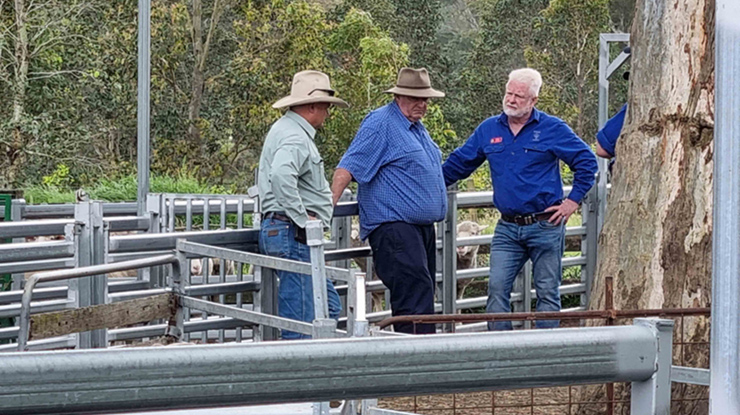 Detective Chief Inspector Cameron Whiteside (far right) speaks with a Tocal Agricultural College Trainer and Queensland Police Stock Squad Officer at a RCPT training day.
Detective Chief Inspector Cameron Whiteside (far right) speaks with a Tocal Agricultural College Trainer and Queensland Police Stock Squad Officer at a RCPT training day.
Tips to stop stock thieves in their tracks
NSW Police State Rural Crime Coordinator, Detective Chief Inspector Cameron Whiteside APM, has a simple message for any stock theft producer victim.
“Report. Report. Report!”
One of the biggest challenges his team faces with on-farm theft is a reluctance by many producers to make a police report.
It’s one of the reasons the NSW Rural Crime Prevention Team (RCPT) has worked hard since 2018 to gain confidence of country communities through improved engagement and demonstrated understanding of rural industries.
“Many of my team members are producers themselves, or they’ve worked in the industry in jobs such as shearing or wool-classing, so they’ve got industry knowledge,” he said.
“We’re not there to tell producers how to run their business but we can support them and help them reduce their vulnerability to theft in simple, actionable ways.”
His team’s work is improving perceptions of NSW Police in country areas, with producers telling the 2021 Farm Crime Survey that an encounter with the RCPT left them feeling “significantly more positive about policing overall.”
Don’t delay reporting
Delays in reporting present one of the biggest challenges to policing – making it harder for investigators to collect reliable eyewitness accounts and forensic evidence. With stock
theft, delayed reporting risks animals being on the other side of the country (or on a plate!) by the time a police investigation is opened.
Producers’ reluctance to report a theft can be due to several factors, including a level of disbelief that someone would steal from them or fears of retaliation from the offender.
“It could also be the case that their record keeping isn’t up to date – they mightn’t have tagged their animals or recorded their stock transfers on the National Livestock Identification System (NLIS). If that’s the case, identifying which animals have been taken can be a real issue but we’ll do our best to support victims of rural crime.”
Det Ch Insp Whiteside suggests producers conduct regular Property Identification Code (PIC) reconciliations on the NLIS to ensure they are prepared should they need to report stolen stock.
Whatever the reason for hesitating, his advice remains the same: don’t delay reporting – even if you think the animal has simply strayed, you should still report it to the police as soon as possible.
Heightened risk
Rates of stock theft tend to follow market price trends, with higher cattle and sheep prices often leading to higher rates of theft. Conversely, when feed becomes scarce during drought, thefts drop because the cost of feeding stolen livestock rises.
In the 12 months to July 2024, the incidence of stock theft reported to NSW Police reduced 28% compared to12 months prior. During the same period, average market prices had also declined, with cattle prices down 27% (average price based on ‘cow’ value) and sheep prices dropping 39% (average price based on ‘ewe’ value).
Risk versus reward
“When you consider the risk versus reward of stealing livestock, the reward is much higher than the risk,” Det Ch Insp Whiteside said.
“We need to reverse that equation and start making it much harder for the criminals.”
In his experience, a stock thief is like any other in that they’ll always look for the easiest target.
He suggests making your property a harder target by considering a few simple and actionable security measures, including:
- GPS tagging: Global Positioning System (GPS) tags, in addition to NLIS tags, can be a game-changer for stock crimes. During a GPS device trial at the University of New England, the RCPT implemented a mock stock theft and was able to recover the tagged stock within 25 minutes.
- CCTV coverage: Closed circuit television (CCTV) cameras can be a deterrent. With many affordable systems on the market and internet coverage more accessible in rural areas, it’s worth investigating options. Your local farm field days can be a good opportunity for this.
- Gate signage: Place ‘private property’ and ‘no trespassing’ signs on gates and fences to encourage all visitors to seek approval before entering your property.
“Your property will never be 100% crime-proof but if you’re aware of the risks, you can reduce them,” Det Ch Insp Whiteside said.
Think like a criminal
When looking to improve your property’s security, it helps to think like a thief.
“Consider the basics – where you might enter the property, what time you would do it and what items you’ve got that might be worth stealing,” Det Ch Insp Whiteside said.
While livestock might be your primary concern, thieves might just as easily be targeting your firearms, fuel or machinery.
“Make sure your firearms are securely locked and consider simple measures such as having a clear line of sight to things like your fuel tank.”
Det Ch Insp Whiteside also suggests considering the location of your infrastructure.
“Your yards might be close to the highway or road, which is great for access when you’re loading your stock, but it’s also very convenient for thieves,” he said.
“It’s also worth bearing in mind that a full moon can present a good opportunity for thieves, making it relatively easy for them to walk stock to their vehicle without the risk of headlights or torches alerting anyone to their presence.”
Rural crime training
With 53 Rural Crime Investigators to cover an area the size of Texas, the RCPT has worked to expand NSW Police’s capacity and capability by providing rural crime-related training (including online and face-to-face) to many regional-based police officers.
“In 2022, we relaunched Operation Stock Check which saw us train police, particularly Highway Patrol, in what to look for when pulling over stock vehicles. The focus was on understanding what paperwork the transporters are required to carry and identifying questionable animal welfare and fit-to-load issues.”
Stock thieves are unlikely to have the electronic or paper National Vendor Declaration (NVD) required to transport animals, so that should instantly raise alarm bells. It’s also a good reminder to producers that they need to make sure their paperwork is complete and correct before dispatching a consignment.
“Checking the paperwork is a simple way to immediately identify if something isn’t right and collect evidence about any potential crime. Those trained officers now have the skills necessary to understand what’s required.”
The training helped officers who might have been born and bred in the city to engage more effectively with rural communities and identify when something was out of place.
Following the success of Operation Stock Check, most Australian jurisdictions have adopted at least some form of those approaches.
|
Det Ch Insp Whiteside’s top five security tips
Reporting stock theft
View the NSW Police Stock Theft Report Template, which shows information police will need to start a stock theft investigation. |




